Unfortunately, joint problems are pretty common in dogs.
Some puppers are genetically predisposed to them, some develop them after a lifetime of intense activity or injury, and some end up with ailing joints after lugging around excess body weight for years.
And while joint problems aren’t life-threatening or as serious as some other health issues, it can drastically reduce your dog’s quality of life. Canines with osteoarthritis or other joint issues not only have trouble running, jumping, and playing like their four-footed pals, they can even suffer from things like poor sleep quality and depression.
Fortunately, there are a number of supplements that seem to help alleviate the symptoms of arthritis, dysplasia, and other types of joint disease. These types of supplements vary in several ways, but most have two common active ingredients: glucosamine and chondroitin.
We’ll explain what these supplements are, point out some of the beneficial effects they often provide canines with osteoarthritis and other joint problems, and identify a few of our favorite glucosamine and chondroitin supplements below.
Best Glucosamine & Chondroitin for Dogs: Quick Picks
- #1 Nutramax Dasuquin with MSM [Best Overall Glucosamine and Chondroitin Supplement ]: A vet-recommended chewable containing joint-boosting glucosamine, chondroitin, and MSM, along with antioxidants to battle inflammation and ASU for cartilage health.
- #2 Alpha Dog Nutrition FREE RANGE Joint Supplement [Best Powdered Glucosamine and Chondroitin Supplement]: An easy-to-feed, beef-flavored, US-made powder featuring a combination of glucosamine, chondroitin, and MSM and designed for active dogs.
- # 3 Nutramax Cosequin Joint Supplement [Best Budget-Friendly Glucosamine and Chondroitin Supplement]: A no-fuss fix that supports your dog’s joint health with glucosamine, chondroitin, and MSM in a tasty chicken tablet.
- #4 Flexpet [Best GMO-Free Glucosamine and Chondroitin Supplement]: Perfect for pet parents seeking a GMO-free option, these tablets aid your dog’s joints with a blend of glucosamine, MSM, CM8, and bromelain.
Joint Supplement Ingredients: What Are Glucosamine & Chondroitin?

As mentioned, many of the best dog joint supplements include glucosamine and chondroitin (most contain other active ingredients too, but glucosamine and chondroitin are undoubtedly the most common).
We’ll try to explain a bit about each of these compounds and how they’re used in the treatment of dogs with joint issues below.
Glucosamine for Dogs
Glucosamine is a naturally occurring amino acid found in many living animals, but it’s found in the highest concentration in cartilage — the spongey material that helps cushion your canine’s joints.
Healthy animals can synthesize enough glucosamine naturally to keep their cartilage healthy, but some — such as canines with osteoarthritis — suffer from damaged cartilage. And this leads to bone-on-bone contact, which leads to pain and immobility.
But glucosamine supplements can aid in this, as they help your dog’s body build new cartilage.
Chondroitin for Dogs
Chondroitin is another naturally occurring element found in animal cartilage.
While glucosamine is responsible mainly for helping to build new, healthy cartilage and other connective tissues, chondroitin blocks destructive enzymes that break down cartilage in your dog’s joints.
You could say that chondroitin holds back the enemies while glucosamine does the repairs! And it is because these supplements both work in subtly different ways that they’re often paired together.
As a bonus, some veterinarians believe that the two supplements have a synergistic effect when used together in the treatment of osteoarthritis or other joint problems (and they tend to do so without causing any additional adverse effects).
In other words, the combined value of chondroitin and glucosamine is greater than the sum of their parts.
What Health Problems Can Glucosamine & Chondroitin Treat?
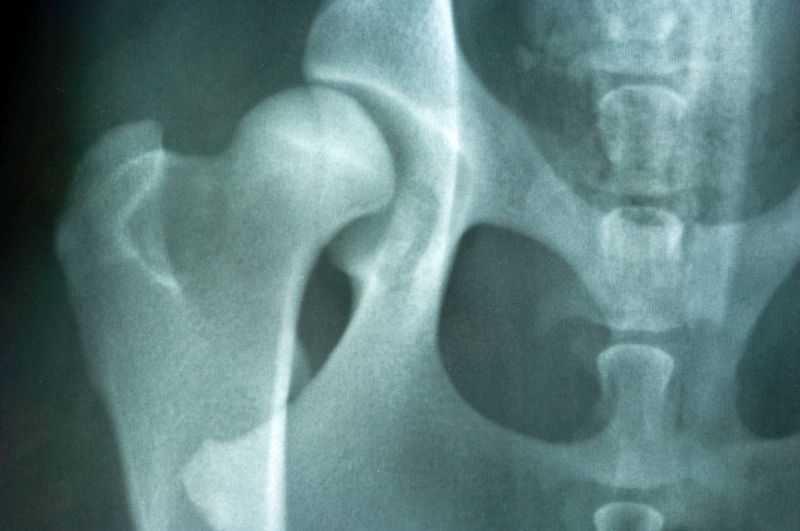
It is important to note that glucosamine and chondroitin are not magic, nor do they help all dogs feel better. Often, the only way to know whether they’re a good option for your dog is by discussing the issue with your vet and then trying ’em out (assuming your vet gives you the green light)!
Glucosamine and chondroitin can both be purchased via over-the-counter supplements, making them very convenient to obtain for pet parents. And though they can cause a few adverse effects in rare cases, these side effects are generally quite mild.
With all that said, glucosamine and chondroitin have helped:
- Canines with osteoarthritis
- Dogs with hip dysplasia
- Dogs suffering from elbow dysplasia
- Canines who’re recovering from injuries
- Poor pooches who’re recovering from joint surgery
- Repairing damaged cartilage in aging dogs
- Canines who require spinal disk treatment
What Are The Best Glucosamine& Chondroitin Supplements For Dogs?
There are tons of glucosamine and chondroitin supplements for dogs available online and in stores, which can make things tough on owners. And because different supplements contain varying concentrations of glucosamine and chondroitin, things can get even tougher for owners trying to help dogs exhibiting signs of osteoarthritis or other ailments.
But we’ve put together a few of our favorite options to help narrow down your choices.
Just remember that you should always discuss the use of any supplements with your vet before you start administering them to your dog.
1. Dasuquin Chewable Tablets for Dogs
About: Dasuquin Chewable Tablets are a vet-recommended supplement providing comprehensive joint support via a top-notch blend of ingredients, including glucosamine, chondroitin, and methylsulfonylmethane (MSM) – a natural organic compound. It’s available in two potencies, with one intended for small and medium dogs and another for pups weighing more than 60 pounds.
This is a sponsored placement, in which an advertiser pays a fee to be featured in this article. Learn more
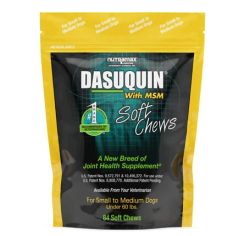
Dasuquin Chewable Tablets for Dogs
A combination supplement made with glucosamine, chondroitin, MSM, and ASU.
Features:
- Contains 600/900 milligrams glucosamine, 400/800 milligrams MSM, and 250/350 milligrams chondroitin (small/large breed) per chewable
- Made with inflammation-fighting antioxidants from green tea extract and Boswellia serrata, plus cartilage-supporting ASU
- Formed into tasty, chewable tablets
- Made in the USA
Ingredients List
Glucosamine Hydrochloride, Methylsulfonylmethane (MSM), Sodium Chondroitin Sulfate, Avocado/Soybean Unsaponifiables (ASU) Powder, Boswellia Serrata Extract...,
Green Tea Extract, Brewers Dried Yeast, Dextrose, Lecithin, Microcrystalline Cellulose, Mixed Tocopherols, Natural And Artificial Flavors, Silicon Dioxide, Soy Protein Isolate
Pros
- Vet-trusted brand with years of use and data behind it
- Most pup parents report an improvement in canine mobility
- Easy to administer, with no messy powders or liquids
Cons
- On the pricier side
- Picky dogs may refuse tablets
2. Alpha Dog Nutrition FREE RANGE Joint Supplement
About: Alpha Dog Nutrition Free Range Joint Supplement comes in a delicious beefy powder that easily spreads over your pup’s food without any fuss. Perfect for pickier dogs or those who can’t stomach chewables, it delivers a solid dose of joint-boosting nutrients in every scoop.
This is a sponsored placement, in which an advertiser pays a fee to be featured in this article. Learn more
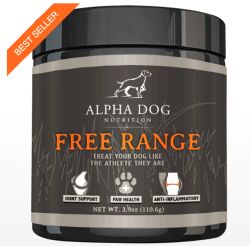
Alpha Dog Nutrition FREE RANGE Joint Supplement
An American-made, tasty beef powder rich in glucosamine, MSM, and chondroitin.
Features:
- Contains 700 milligrams glucosamine, 600 milligrams MSM, and 300 milligrams chondroitin per scoop
- Each tub contains about 45 scoops (45 servings for dogs 30 pounds and up)
- Designed by nutritionists
- Made in the USA
Ingredients List
Glucosamine HCI, MSM (Methylsulfonylmethane), Chondroitin Sulfate, Brewers Yeast Powder, Vitamin E...,
Desiccated Beef Liver Powder, Maltodextrin, Silicon Dioxide
Pros
- Powder mixes into food well and entices picky pup palates
- Affordably priced compared to tablet options
- Comes with a 60-day Money Back Guarantee
Cons
- Not every dog will care for the flavor
- Can be messy
3. Cosequin Chewable Dog Tablets
About: Cosequin Chewable Tablets provide your dog with a daily dose of joint support without any messy liquids or powders. Best of all, it’s reasonably priced, saving your hard-earned treat dollars for funtastic Fido activities.
This is a sponsored placement, in which an advertiser pays a fee to be featured in this article. Learn more
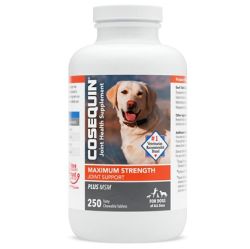
Cosequin Chewable Dog Tablets
A chicken-flavored, glucosamine, chondroitin, and MSM chewable that won’t break the bank.
Features:
- Contains 600 milligrams glucosamine, 300 milligrams chondroitin, and 250 milligrams MSM per tablet
- Suitable for dogs of all sizes
- Comes in a yummy chicken-flavored chewable tablet
- Made in the USA
Ingredients List
Glucosamine Hydrochloride, Sodium Chondroitin Sulfate (derived from bovine cartilage), MSM (Methylsulfonylmethane), Manganese (Manganese Ascorbate), Brewers Dried Yeast...,
Dextrose, Magnesium Stearate, Microcrystalline Cellulose, Natural and Artificial Flavors, Silicon Dioxide
Pros
- Excellent choice for everyday joint supplementation
- Affordably priced
- Crumbles easily over food, if needed
Cons
- Flavor isn’t a hit with every dog
- Dogs with severe joint issues may need a stronger supplement to enjoy a reduction in pain
Dasuquin and Cosequin are admittedly similar supplements — they’re even made by the same manufacturer! This can obviously cause confusion among owners, but don’t worry!
We explain the full difference between Dasuquin and Cosequin here!
4. Flexpet
About: Flexpet takes a multi-pronged approach to combating canine discomfort with joint-supportive MSM and glucosamine, cartilage-nourishing collagen, and anti-inflammatory ingredients, including bromelain and cetyl myristoleate (CM8). All ingredients are GMO-free and sourced from North America for added peace of mind.
This is a sponsored placement, in which an advertiser pays a fee to be featured in this article. Learn more
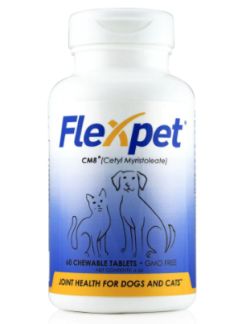
Flexpet
Chewable, GMO-free tablets made with glucosamine, chondroitin, CM8, and bromelain.
Features:
- Contains 500 milligrams MSM and 270 milligrams glucosamine per 2 tablets
- Each bottle contains 60 tablets
- Safe for all breeds and life stages, per the manufacturer
- Made in the USA with human-grade ingredients
Ingredients List
Methylsulfonylmethane (MSM), Glucosamine Sulfate Potassium, Cetyl Myristoleate (CM8), Hydrolyzed Collagen Type II...,
Bromelain, Vitamin C, Digestive Enzyme, Dicalcium Phosphate, Magnesium Stearate, Maltodextrin, Microcrystalline Cellulose, Pork Liver, Silicon Dioxide, Stearic Acid, Sucrose
Pros
- Most owners report improvement in canine movement and comfort
- Dogs seem to love the taste, but if not, they crumble easily over food
- Dog and cat-friendly formula ideal for multi-species households
Cons
- Large dogs may need upwards of 4 chewables a day
- Somewhat pricey
Signs Your Dog May Be Suffering From Joint Pain

Many owners may see their senior dog slowing down and assume it’s simply a cause of old age. However, while it is true that activity levels often decline as dogs age, joint pain is not necessarily a normal part of the aging process, and it is definitely not something you should ignore.
Some signs that your dog is suffering from arthritis and might benefit from glucosamine and chondroitin supplements include:
- Difficulty climbing stairs
- Trouble getting in and out of vehicles
- Limping and/or stiffness (especially in the morning and during cold weather)
- Reduced interest in activities, play, or walks
- Difficulty lying down or standing up
- Swollen joints
Keep in mind that all dogs are individuals, and no two puppers will experience similar experiences with a given ailment.
For example, the progression of arthritis may be very rapid in some dogs, leading to serious pain and limited mobility in a matter of months. But other dogs may see the signs and symptoms of osteoarthritis worsen over many years.
We bring this up only to once again emphasize the importance of speaking with your vet at the first hint of joint pain, so you can begin a supplementation regimen promptly.
Do Glucosamine & Chondroitin Work For Dogs with Osteoarthritis?

Osteoarthritis in dogs is likely the most common ailment for which glucosamine and chondroitin are used. But unfortunately, there is still much to be learned about the potential value these joint supplements provide and the general efficacy of glucosamine and chondroitin.
Some studies have shown Glucosamine does help treat osteoarthritis in dogs, provide a clinical benefit, and help to achieve a reduction in pain, while other clinical trials claim the supplement is largely ineffective.
Other studies report that one form of glucosamine — specifically, glucosamine sulfate — did offer a substantial reduction in pain, roughly on par with other drugs for dogs with osteoarthritis. Meanwhile, it’s counterpart — glucosamine hydrochloride — was ineffective and rarely provided a similar reduction in pain levels.
When it comes to studies specifically for glucosamine’s effect on osteoarthritis in canines, there is even less to go on. However, one study in 2007 by the College of Veterinary Medicine at University of Georgia found that glucosamine offered a “moderate level” of comfort that matched some prescription drugs.
The good news is that, while definite answers regarding the benefits of glucosamine are still hazy and we need more clinical trials, glucosamine rarely has any side effects (and when it does, the side effects are very minor), making it a very safe option for managing dog arthritis pain.
As noted, adverse effects are uncommon. When they do occur, they can include:
- Insomnia
- Fatigue
- Excessive thirst and urination (at high doses)
- Allergy issues
(Always seek immediate veterinary care if you suspect your dog is suffering from any serious adverse reaction — especially an allergic reaction.)
It’s also worth noting that, since glucosamine is a sugar-based substance, it may prove problematic for dogs with diabetes.
In this video, veterinarian Dr. Bob Pane talks about the benefits of glucosamine and chondroitin, how they can help support healthy joints, and why it’s important to use quality supplements during the management of osteoarthritis and other ailments.
Issues With Glucosamine & Chondroitin Research: Scientific Evidence
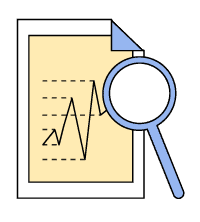
You may be wondering — why isn’t there more data available about the effects of glucosamine and chondroitin in treating canines with osteoarthritis or other joint problems if they can potentially be so beneficial?
After all, there is a ton of anecdotal evidence backing the use of these supplements, and they frequently seem to produce a higher level of comfort among canines.
So, why are empirical data and clinical trials so rare?
The main reason why there is so little data about the effectiveness of these substances is because glucosamine and chondroitin can’t be patented. This means large pharmaceutical companies can’t make much money off of them, so they don’t bother spending money researching and developing these supplements.
Glucosamine and chondroitin are also classified as nutraceuticals. Nutraceuticals are naturally occurring substances that are present in many food products – in fact, nutraceuticals fall into the same class at vitamins.
Nutraceuticals aren’t controlled by the FDA, and therefore have little independent research backing them.
Where to Get Glucosamine & Chondroitin For Dogs

Glucosamine and chondroitin for dogs can be found in many canine supplements available on the market. These dog supplements come in a variety of forms, including:
- Liquid
- Pills
- Powdered
- Tablets
The easiest way to obtain them is simply by clicking on one of the links above. However, you can also find these types of supplements at retail pet stores, online pet pharmacies, and even from some vets.
Just be sure to steer clear of glucosamine and chondroitin supplements designed for people, as human glucosamine and chondroitin supplements often contain ingredients that are toxic for dogs. The actual active ingredients in human glucosamine and chondroitin will often be the same as they are in canine dietary supplements, but it is the inactive ingredients that often lead to trouble.
Glucosamine and chondroitin supplements may be some of the most commonly used treatments for osteoarthritis, but they aren’t the only non-prescription treatment options available for your dog’s ailing joints. You may also want to consider:
- Dog foods designed for joint health, which are typically fortified with glucosamine and/or chondroitin.
- Supplements containing omega-3 fatty acids, as they can help reduce inflammation and the associated pain.
- Heated dog beds, as they may provide some gentle pain relief for aching joints (not to mention, some doggos just find that they produce a higher level of comfort than non-heated beds).
Of course, these aren’t all mutually exclusive. You may, for example, use a high-quality glucosamine and chondroitin supplement alongside an add-on therapy, such as a heated dog bed to treat canine arthritis.
How Long Will It Be Before I Know If The Glucosamine Is Helping?

Generally, owners shouldn’t expect to see changes in joint function, a reduction in pain, or any other beneficial effects for at least a few weeks after beginning a glucosamine and chondroitin supplementation regimen. In fact, veterinarians recommend putting your pet on glucosamine and chondroitin for at least three months before evaluating the treatment.
With any luck, after taking the supplements for a month or so, you’ll begin to see changes in your pet, and he’ll start to enjoy having healthy joints again. This may include things like a higher level of comfort on a daily basis or increased joint mobility.
Just understand that your dog will likely need to take these supplements every day — even multiple times a day depending on your dog’s size and the dosage form.
If you see that the glucosamine and chondroitin are helping your dog, he may need to take them for the rest of his life to continue to stay comfortable; it’s likely that these supplements will only work if you continue to administer them over time. In fact, cartilage degeneration may begin to reoccur four to six months after you stop glucosamine and chondroitin therapy.
Point being, while glucosamine and chondroitin are often helpful for giving your doggo back his healthy joints and (sometimes) avoiding costly surgeries, they may represent some moderate, long-term costs.
How Much Glucosamine & Chondroitin Can You Give A Dog?

You’ll have to consult your vet to obtain the best possible dosage and administration schedule for your dog — that’s the only way to know for sure how to provide your dog with therapeutic levels of the supplements and enjoy the best beneficial effects.
But generally, vets recommend around 500 mg of glucosamine and 400 mg of chondroitin per 25 pounds of body weight.
For oral glucosamine supplements, here’s the daily dosage that one veterinarian recommends to obtain therapeutic levels:
| Dog Weight | Glucosamine Dosage |
|---|---|
| 5 – 20 lbs | 250-500 mg |
| 20 – 45 lbs | 500 mg |
| 45 – 90 lbs | 1,000 mg |
| 90 lbs + | 1,500 mg |
Here are the same recommendations for your dog’s daily dosage of chondroitin:
| Dog Weight | Chondrotin Dosage |
|---|---|
| Less than 80 lbs | 900 mg |
| Over 80 lbs | 1,800 mg |
Note that some vets and manufacturers recommend that you begin by administering a relatively high dose of these supplements. Then, a few months down the line, you’ll switch to a lower, “maintenance dose,” for the long-term.
***
Have you used chondroitin and glucosamine supplements to ease your dog’s arthritic pain? What were the results? Did you notice any beneficial effects? What kind of dosage level did your vet recommend to achieve therapeutic levels?
What about some of the other joint-supporting supplements like those containing omega-3 fatty acids? Have you tried any other strategies for treating your dog’s joint pain?
Share your thoughts and experiences in the comments!













Leave a Comment